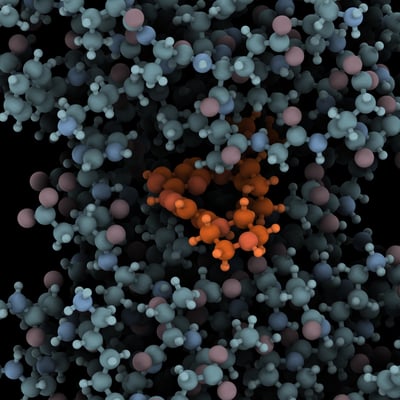Categories Cancer Treatment



Relevance: Medium-High
Most relevant for: People with early stage breast cancer who have an inherited BRCA mutation
Study: Research on the PARP inhibitor talazoparib (Talzenna) for early-stage breast cancer is promising
The PARP inhibitor talazoparib (Talzenna) has been useful for treatment of advanced or metastatic breast cancer for patients with BRCA mutations. A preliminary study showed that the majority of patients who took talazoparib alone before surgery for early-stage breast cancer had effective treatment and manageable side effects. Expanded clinical trials are in progress to verify this result. (10/4/19)
READ MORE ›


Relevance: Medium-High
Most relevant for: People with metastatic breast cancer
Study: Inherited mutations in metastatic breast cancer patients
Recent research shows that a significant portion of patients with metastatic breast cancer have harmful mutations in a gene associated with hereditary breast cancer and increased breast cancer risk. (9/26/19)
READ MORE ›


Relevance: Medium-High
Most relevant for: People currently taking a CDK inhibitor
Guideline: FDA issues warning on CDK inhibitors
The U.S. Food and Drug Administration issued a safety alert for CDK inhibitors, including Ibrance (palbociclib), Kisqali (ribociclib), and Verzenio (abemaciclib). (9/24/19)
READ MORE ›


Relevance: High
Most relevant for: People diagnosed with metastatic breast cancer
Study: Supportive care can improve quality of life for people with metastatic breast cancer
Metastatic breast cancer patients have unique needs for treatment and care. Connecting patients to appropriate support services and palliative care is an area of need in health care. A recent study reported improvement in metastatic breast cancer patient quality of life and wellness with an intervention program called the Supportive, Education and Advocacy (MBC-SEA) program. (8/21/19)
READ MORE ›


Relevance: Medium-High
Most relevant for: Young women who find a breast lump and young women newly-diagnosed with breast cancer
Study: Diagnosis and treatment delays in young women with breast cancer
Young women are more likely to have delays in a breast cancer diagnosis and treatment. Factors that affect these delays include pregnancy, breastfeeding, financial concerns and having a family history of breast or ovarian cancer. (8/5/19)
Este artículo está disponible en español.
READ MORE ›


Relevance: High
Most relevant for: People with metastatic, hormone-positive, Her2-negative breast cancer
Study: CDK inhibitors may increase survival for ER-positive metastatic breast cancer patients
The phase III MONALEESA-7 study is a clinical trial looking at the effect of a type of treatment known as a CDK4/6 inhibitor in pre- or perimenopausal women with hormone receptor–positive advanced breast cancer. (7/22/19)
READ MORE ›



Relevance: High
Most relevant for: People diagnosed with pancreatic cancer who have a BRCA mutation
Study: Results from the POLO trial: Olaparib may delay cancer progression in metastatic pancreatic cancer patients with BRCA mutations.
Note: On 12/27/19, the FDA approved olaparib for treatment of pancreatic cancer in people with a BRCA mutation based on the results of the POLO study.
The POLO clinical trial looks at whether the PARP inhibitor olaparib improves outcomes for those with metastatic pancreatic cancer after platinum-based chemotherapy. (7/3/19)
READ MORE ›


Relevance: High
Most relevant for: People with early-stage, Her2-positive breast cancer (stages 1-3)
Study: New targeted therapy approved for early-stage HER2-positive breast cancer
The KATHERINE trial looked at the benefit of the new drug, Kadcyla, for treating early-stage breast cancer after surgery and chemotherapy. The results of this study led to FDA approval in May 2019. (6/17/19)
READ MORE ›


Relevance: High
Most relevant for: People with metastatic, triple-negative breast cancer
Guideline: FDA approves an immunotherapy treatment for some patients with triple-negative breast cancer
THIS INFORMATION HAS BEEN UPDATED: In August 2021 Roche voluntarily withdrew their FDA accelerated approval for Tecentriq (atezolizumab) in combination with chemotherapy (Abraxane®, albumin-bound paclitaxel; nab-paclitaxel) for the treatment of adults with unresectable locally advanced or metastatic triple-negative breast cancer (mTNBC) whose tumours express PD-L1.
The FDA approved the use of the immunotherapy drug atezolizumab (Tecentriq) in combination with the chemotherapy agent nab-paclitaxel (Abraxane) for certain patients with advanced triple-negative breast cancer. (5/26/19)
READ MORE ›


Relevance: Medium-High
Most relevant for: People with metastatic, triple-negative breast cancer
Study: Smart drug shows promising results for treatment of metastatic triple-negative breast cancer
THIS INFORMATION HAS BEEN UPDATED on 04/27/20: Based on the results from the study reviewed in this XRAY, the U.S. Food and Drug Administration (FDA) has approved sacituzumab govitecan-hizy (Trodelvy), as a treatment for people with metastatic triple-negative breast cancer who have received at least two prior therapies for metastatic disease.
We report results of an early-stage clinical trial of a new class of drugs for metastatic triple-negative breast cancer (TNBC). IMMU-132 is a combination of two different molecules: an antibody that targets certain types of cancer and delivers a chemotherapy drug that can kill cancer cells. This study looks at whether IMMU-132 is safe and effective for treating metastatic TNBC. (4/16/19)
READ MORE ›